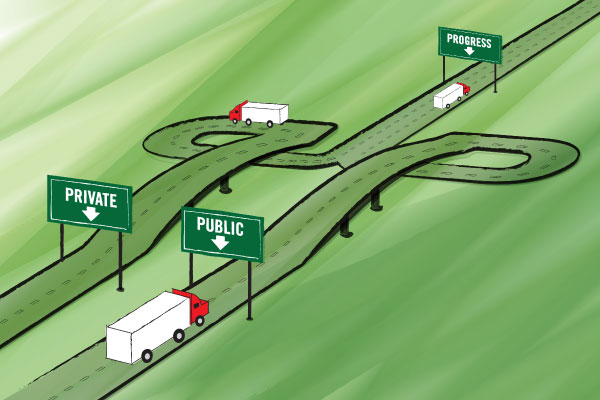Articles
Public Policy
Deregulation Amended and Upended
Dust off your legal textbooks. It’s time to revisit transportation deregulation’s rocky history and defend what we have.
Read More
Shading Green
We know the positive arguments for embracing green. This magazine regularly demonstrates how shippers and service providers are developing sustainability practices across their supply chain touchpoints. Reducing fuel, cube, weight, packaging, waste, and power consumption in the supply chain blends the two shades of green—sustainability and profits. You’ll find measurable examples of both in this […]
Read More
Growing Together: Promoting Government and Industry Collaboration
In Michigan, a state that’s undergoing an unprecedented shift in its economy, Governor Jennifer Granholm established a new committee to create opportunities for the logistics and transportation sector. The group, comprised of politicians, business leaders, community organizers, and supply chain professionals, advises the governor and state agencies on supply chain management initiatives to help the […]
Read MoreAssemble the Fragments
A national transportation policy could help link some good fragments into a coherent plan.
Read More
Paving The Path To Progress
Can public-private partnerships transform America’s ailing transportation infrastructure?
Read MoreShaken and Stirred
Let’s ensure infrastructure development is used for long-term economic growth, not short-term political gain.
Read More
Gearing Up for 100% Air Cargo Screening
A complex shift in the air cargo industry begins in August 2010, when the Transportation Security Administration (TSA) will require 100-percent screening of all air cargo carried in passenger planes departing from or arriving at U.S. airports. In response to the Sept. 11 terrorist attacks, the TSA created a security mandate with an initial step […]
Read More
ISF Regulation: 10+2 Much?
Effective Jan. 26, 2010, U.S. ocean freight importers must complete a properly executed Importer Security Filing (ISF) before loading cargo onto a vessel at a foreign port. Also known as 10+2, the Customs and Border Protection (CBP) regulation, intended to ensure the safety of ocean containers entering U.S. ports, requires U.S. importers or agents to […]
Read More